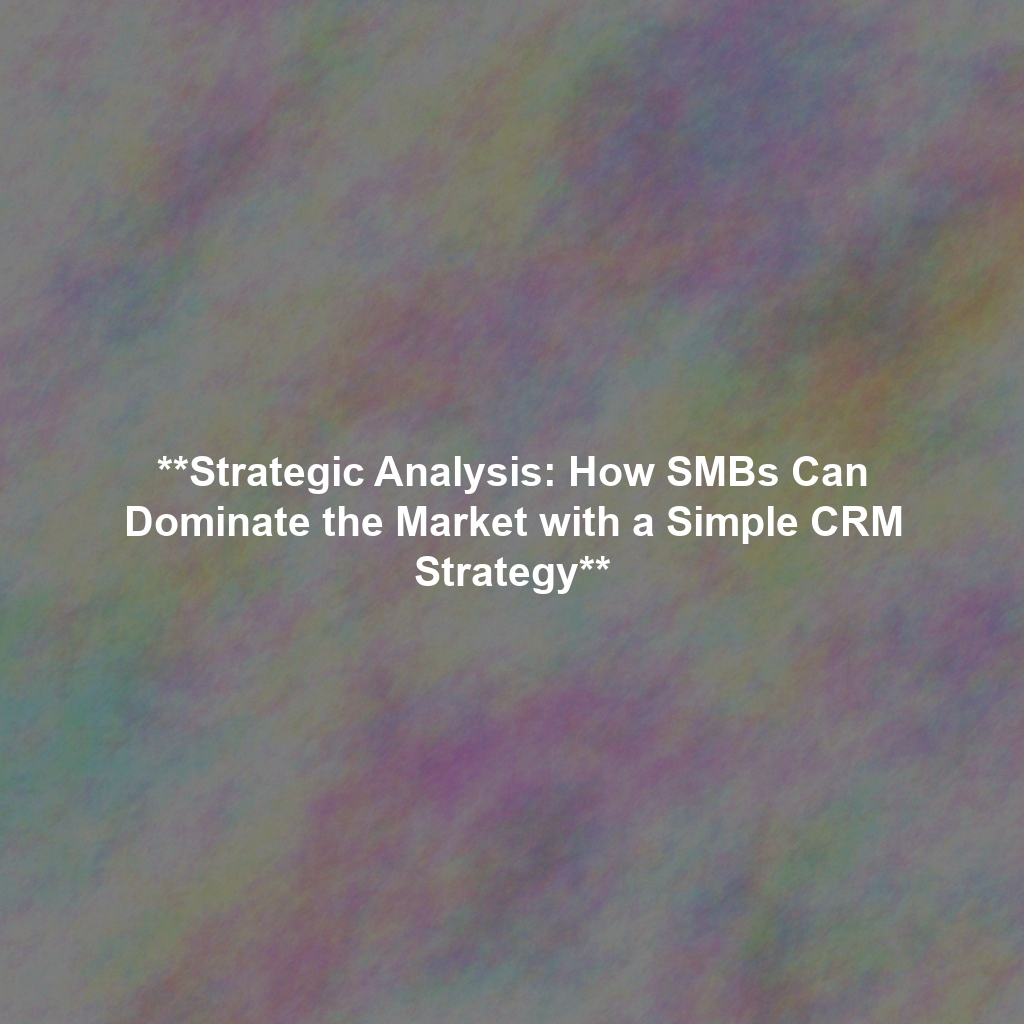Are you a small or medium-sized business (SMB) owner or sales manager struggling with your Customer Relationship Management (CRM) system? Do you find yourself lost in a maze of features you don’t need, paying exorbitant per-user fees, and facing low adoption rates among your team? You’re not alone. The CRM market is saturated with complex, enterprise-focused solutions that often overwhelm SMBs. This market analysis will dissect the challenges, illuminate the opportunities, and show you how to thrive with a simple CRM strategy.
The Problem: CRM Overload and the SMB Struggle
The traditional CRM landscape is littered with overly complex platforms. These systems, designed for massive corporations, often come with:
- Feature Bloat: Hundreds of features, most of which go unused by SMBs.
- High Costs: Per-user fees quickly add up, especially for growing teams.
- Complex Implementation: Long setup times and the need for specialized training.
- Low Adoption Rates: Sales teams often resist using clunky, difficult-to-navigate systems.
This creates a significant hurdle for SMBs. You need a system that simplifies your sales process, strengthens customer relationships, and streamlines your operations – without the overwhelming complexity. This is where a strategic shift towards a simple CRM becomes crucial.
Understanding Your Market Position: A Crucial First Step
Before choosing any CRM, you must understand your business’s position within the market. This involves:
- Defining Your Target Audience: Who are your ideal customers? What are their needs and pain points?
- Analyzing Your Competition: What CRM solutions are they using? What are their strengths and weaknesses?
- Identifying Your Unique Value Proposition: What makes your business stand out? What problems do you solve better than anyone else?
This initial assessment will guide your CRM selection and implementation, ensuring it aligns with your business goals.
The Power of a Simplified CRM: Focusing on What Matters
The key to CRM success for SMBs lies in simplification. A simple CRM focuses on the core features that drive results:
- Contact Management: Centralized storage of customer information, accessible to your team.
- Lead Management: Tracking leads, nurturing them through the sales pipeline, and converting them into customers.
- Sales Pipeline Management: Visualizing the sales process, identifying bottlenecks, and optimizing performance.
- Reporting and Analytics: Gaining insights into sales performance, customer behavior, and overall business health.
By streamlining your CRM, you empower your team to focus on what truly matters: building relationships and closing deals.
Case Study: The Rise of “The Coffee Bean” with Simple CRM
Let’s look at a hypothetical example. “The Coffee Bean,” a local coffee shop chain, was using a complex CRM system. They struggled with low adoption, wasted time navigating unnecessary features, and missed opportunities to connect with their customers. They switched to a simple CRM. Within months, they saw:
- Increased Sales: Sales reps could easily track customer preferences and recommend products.
- Improved Customer Loyalty: Personalized communication led to higher customer satisfaction.
- Reduced Costs: Eliminated per-user fees and saved time on training.
This real-world example (though hypothetical) demonstrates the power of a simplified approach. This is a prime example of a small business truly benefitting from CRM success.
Actionable Steps: Implementing a Simple CRM Strategy
Here’s a step-by-step guide to implementing a successful, simple CRM strategy:
- Define Your Needs: Identify the essential features your team needs.
- Research and Evaluate: Explore CRM options specifically designed for SMBs. Consider free trials.
- Prioritize Simplicity: Choose a platform that is easy to use and navigate.
- Train Your Team: Provide adequate training and support to ensure adoption.
- Integrate with Existing Tools: Connect your CRM with other tools, such as email marketing platforms and accounting software.
- Monitor and Optimize: Regularly review your CRM usage and identify areas for improvement.
- Choose a CRM: SimpleCRM may be a good option.
Key Benefits of a Simple CRM for SMBs
The advantages of a simplified CRM strategy are numerous:
- Increased Productivity: Sales teams can focus on selling, not navigating complex software.
- Improved Customer Relationships: Personalized interactions build stronger connections.
- Reduced Costs: Eliminate unnecessary features and per-user fees.
- Faster Implementation: Get up and running quickly with minimal training.
- Higher Adoption Rates: User-friendly interfaces encourage team participation.
The Future of CRM: Simplicity and User Experience
The future of CRM is undoubtedly focused on simplicity and user experience. The market is shifting towards platforms that prioritize ease of use, affordability, and results. SMBs that embrace this trend will be well-positioned to thrive. This means finding a system that is not only easy to use but also offers the right tools for the job.
FAQ:
- What are the key features of a simple CRM? Contact management, lead management, sales pipeline management, and reporting.
- How can I ensure CRM adoption within my team? Provide adequate training, choose a user-friendly platform, and highlight the benefits of using the CRM.
- Is a free CRM sufficient for my business? This depends on your needs. Free CRMs often have limitations. Consider your growth plans.
Ready to Simplify Your Sales Process?
Stop letting complex CRM systems hold your business back. You need a solution that empowers your team, boosts your sales, and strengthens your customer relationships.
Consider SimpleCRM. It’s the CRM your team will actually use. SimpleCRM strips out 80% of the useless complexity from enterprise platforms, focusing on the core 20% of features that drive real results. Get started in under 15 seconds with no per-user fees, ever.
 Skip to content
Skip to content

